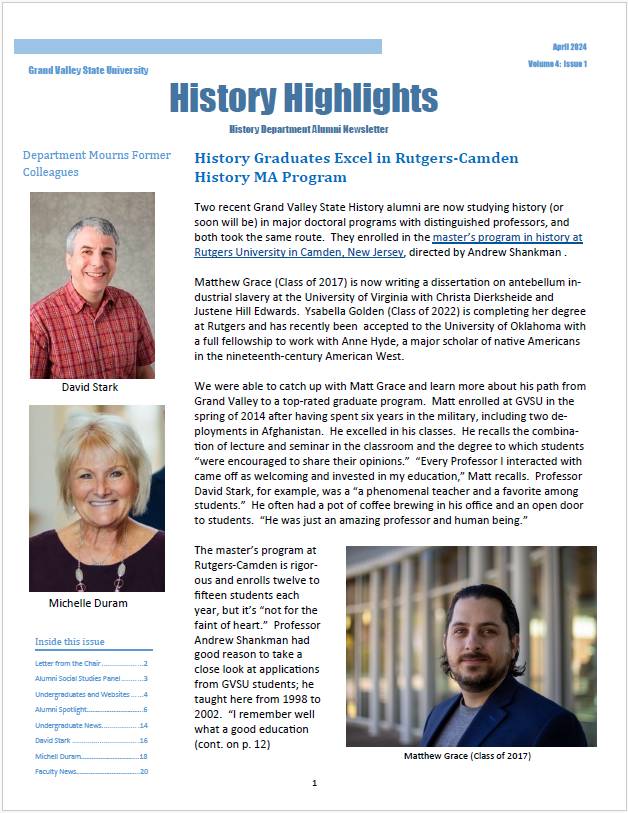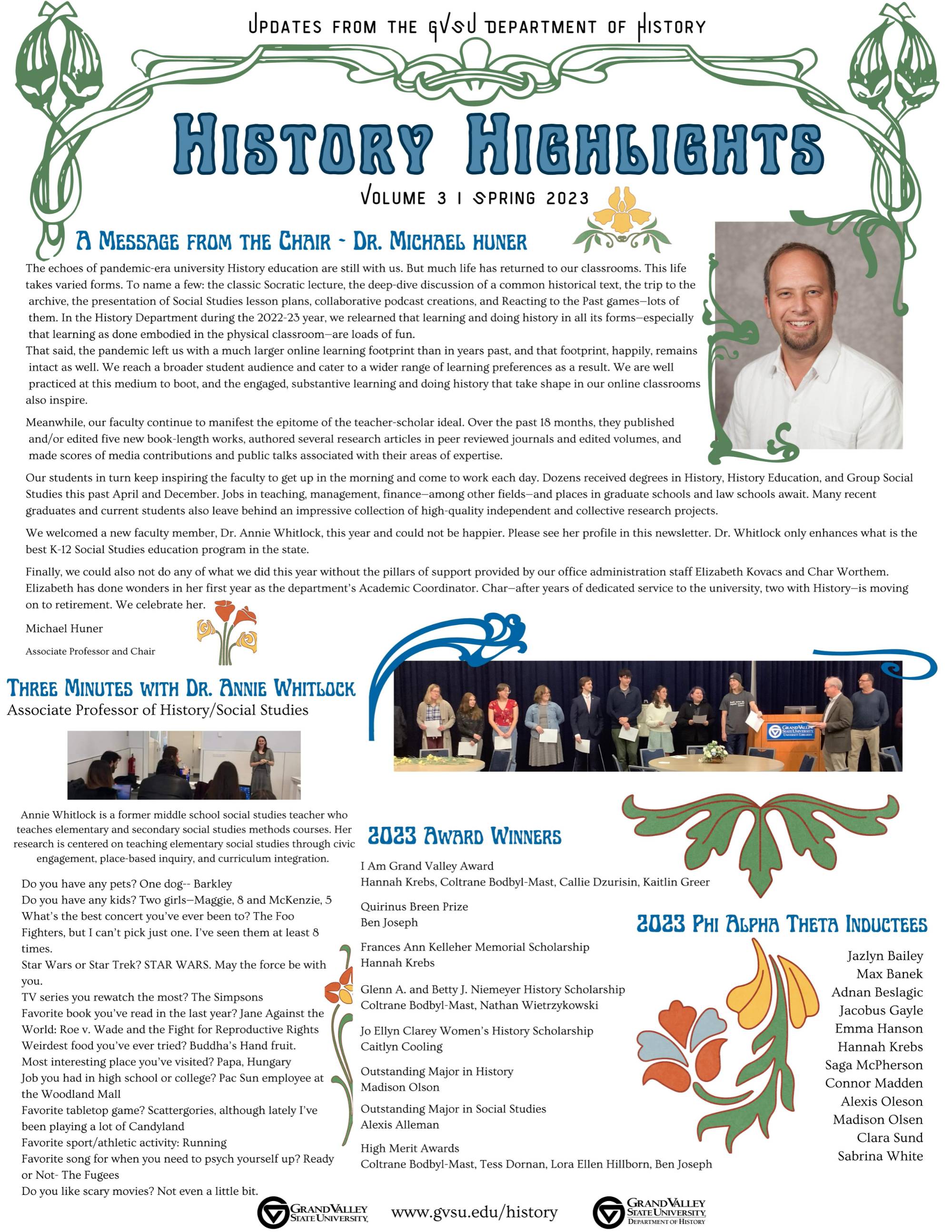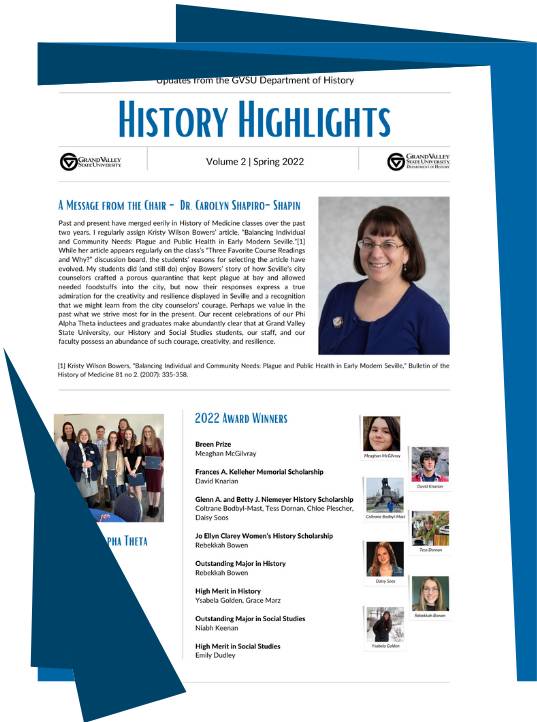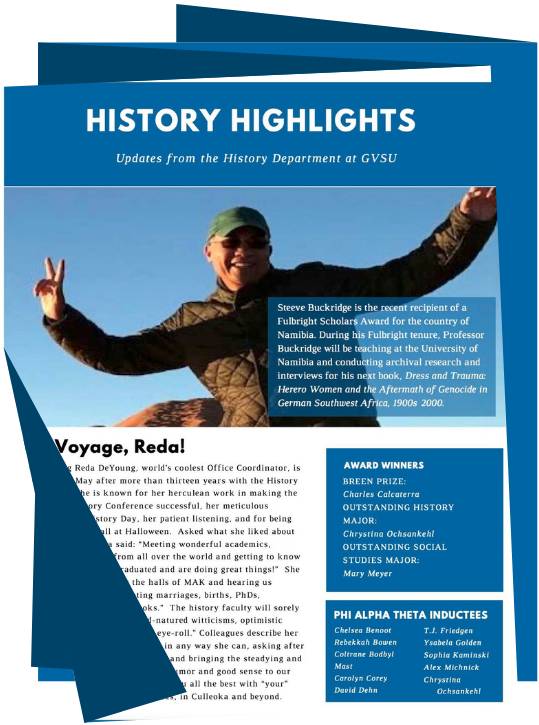Spring 2025 History Newsletter

Inside this Edition
- Professor Daley and Students Explore the History of Black Baseball in Grand Rapids
- Senior Meghan Leach’s Year of Museum Internships
- Senior Thesis: Ben Joseph (Class of 2024) Explores Family History
- History Capstone Students Present Research in Showcase
- Phi Alpha Theta Inductees
- History and Social Studies Undergraduate Awards
A Letter from the Chair – Mike Huner
[1474729077].jpg)
By Michael Huner, Chair, Department of History
In the 2024-2025 academic year, the History Department graduated approximately seventy (70) students from our three major programs (History, Group Social Studies, History Education). They join the thousands of alumni of the GVSU History Department who are leading meaningful lives of perpetual learning, piecing together fulfilling careers, altering small and large chunks of society for the better, and all the while never, ever forgetting the value extracted from the craft of interpreting the past. These students brought immense value to the lives of GVSU History faculty—and the professors’ own pursuit of meaningful professional fulfillment—upon passing through our classrooms. Substantial majorities of our alumni would likely affirm that upon their passing through our classrooms the GVSU History Department faculty reciprocated and then some.
Two new tenure track faculty continued this proud tradition upon completing their first academic year here at Grand Valley: Dr. Blair Stein and Dr. Yue Liang. Professors Liang and Stein enhance our offerings in the History of Science, Technology, and Medicine. Already the feedback received from students and colleagues indicates that their positive impact in teaching and scholarship will register in multiple ways. That said, two other faculty who have been registering such impact for decades are departing at the end of this academic year: Dr. Louis Moore and Dr. Steve Tripp.
Prof. Lou Moore leaves enormous shoes to fill. He is now a world-renowned scholar on the History of Race and Sports in the United States, author of three highly acclaimed books,
but also remains a cool dude who keeps it all real even while reminding about the seriousness of what we do—in our writing, in the classroom, and beyond. He departs for a new position at Michigan State University, luckily not far, just a spell or two down I-96. He devoted fifteen years of his professional life to GVSU and its students. We are grateful.
Prof. Steve Tripp perhaps leaves even larger shoes to fill. Dr. Tripp is arguably the most graceful, sublime writer among a faculty of fine writers. His two books (on the Civil War Era and baseball legend Ty Cobb) are not only substantial contributions to scholarship about the History of the United States. They are pure sugar delight for the reading eye. But that just describes one dimension of Dr. Tripp’s contributions to the discipline. Since 1990, he has evolved into one of the most dynamic teachers among a faculty of dynamic teachers. He embraced experiential, high-impact learning practices in his classroom long before they became trendy buzzwords. Students still randomly approach me to describe in vivid detail how his teaching proved transformative for them. To our immense detriment, Professor Tripp is retiring at the end of the winter 2025 semester.
We welcome new faces but say farewell to veteran hands. The cycle of academic years continues even as larger societal landscapes become more edgy, icy, and slippery to do the good work we do. We plod onward working with “students to achieve a lifetime of learning and purpose which includes a commitment to democratic citizenship” as we have done for the past sixty plus years.
Alumni News
Alumni Spotlight: Alice Kalinowski ‘15 Recognized as Distinguished Alumni-in-Residence
Alice Kalinowski (Class of 2015)
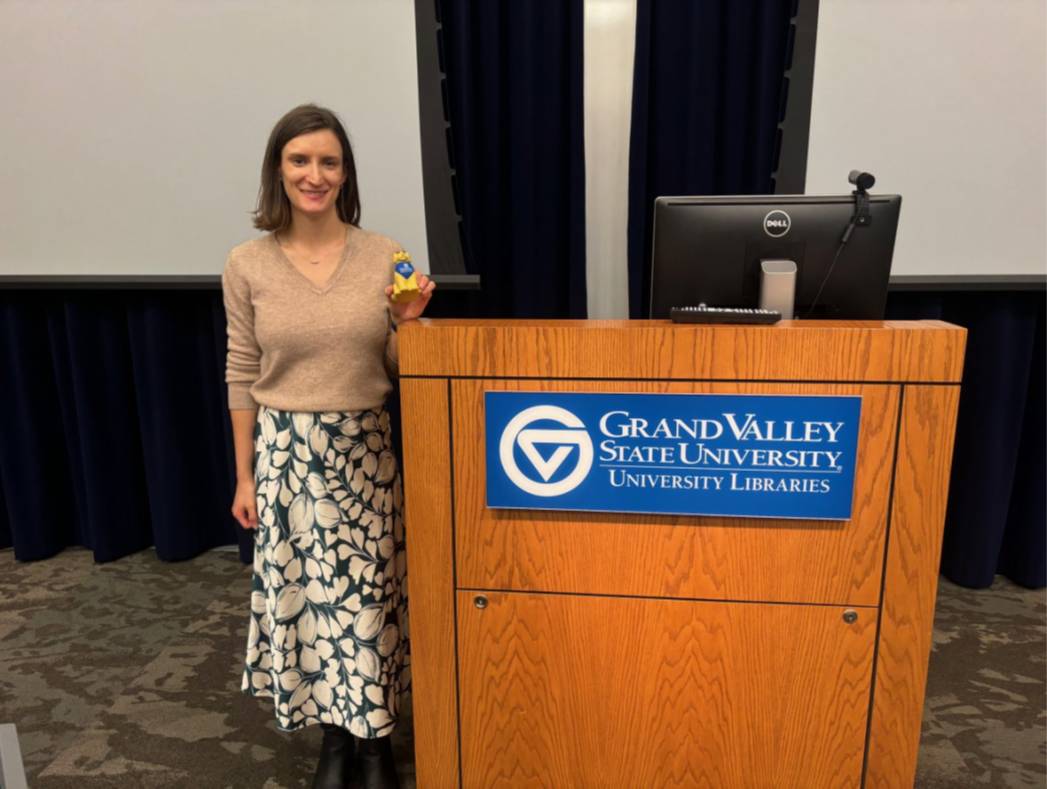
In Fall 2024, the College of Liberal Arts and Sciences at GVSU named Alice Kalinowski (Class of 2015), Public Services Manager at the at Stanford Graduate School of Business Library, a Distinguished Alumni-in-Residence. On Thursday, Oct. 31, Alice gave a presentation on careers in library science to interested students. Later in the day she participated in a panel on the value of education in the humanities in professional life.
Alice earned her BA in history at Grand Valley State and a Masters of Library Science at the University of Pittsburgh, where she worked before assuming her position at Stanford University. She began as a business librarian helping faculty, students, and staff find historical market data, identify business opportunities, and gain access to historical data in newspapers for text and data analysis. In her current position, she oversees library circulation and research support, manages online instructional content, supports collection development, and works with the library leadership on strategic planning.
Librarians work in public, academic, and business settings. Alice explained the variety of career paths in academic libraries, which provide a range of research and teaching support at colleges and universities. She also met with Honors College students while on campus Thursday and Friday, Nov. 1.
Additional Alumni Updates
Casey Hoeve (Class of 2008)
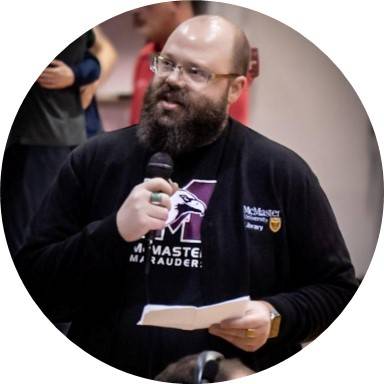
Hannah Krebs (Class of 2024)
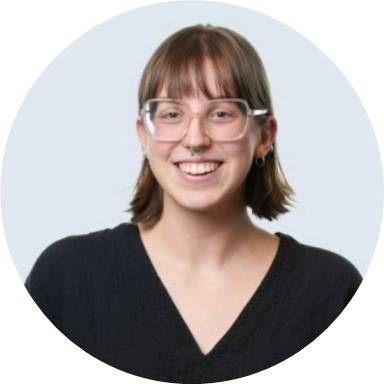
Scott St. Louis (Class of 2016)
[1747419864].jpg)
Casey Hoeve graduated with a degree in biomedical sciences and history from Grand Valley State in 2008. His advisors were Steeve Buckridge and Craig Benjamin, and he took quite a few classes with James Goode.
In Fall 2022, Casey moved from the University of Nebraska-Lincoln, where he was an associate professor and head of content & collections to McMaster University, where he became Associate University Librarian for Content, Access, and Open Licensing. He earned his Masters of Library and Information Science at Drexel University.
Hannah writes: “I started working at Warner, Norcross, and Judd as the Library Research Assistant in August 2024. I help the library manager with the day-to-day tasks of running the firm’s library. My favorite part about this job is that every day is different from the next. On any given day, I could be locating court documents, finding historic photographs, processing new books, learning about the history of a statute, or helping with other re-search needs that arise. I help people with all levels of research experience – both attorneys and staff members.”
Scott St. Louis frequently writes about issues related to scholarly publishing and information science in the digital age, as well as various aspects of history. Here is a sampling of his book reviews and other blog posts, as well as a peer-reviewed article in the Michigan Historical Review:
- "The Power of Disillusionment: Reflections on History, Adulthood, and Access to Knowledge."
- "The Best of Old and New: Historical Scholarship Meets Digital Technology."
- "Ambition in the Stacks: Google and the History of Academic Libraries."
- "Progress Beats Perfection."
- "Web Archives and the Future of Historical Inquiry," parts one and two.
- "Historic Coin Production and the US Mint."
- "Women and American Currency."
- "Coin Availability Disruptions, Past and Present."
- "A 'Self-Made Town': Semi-Annual Furniture Expositions and the Development of Civic Identity in Grand Rapids, 1878–1965."
Social Studies Alumni Reception Held in Grand Rapids April 24
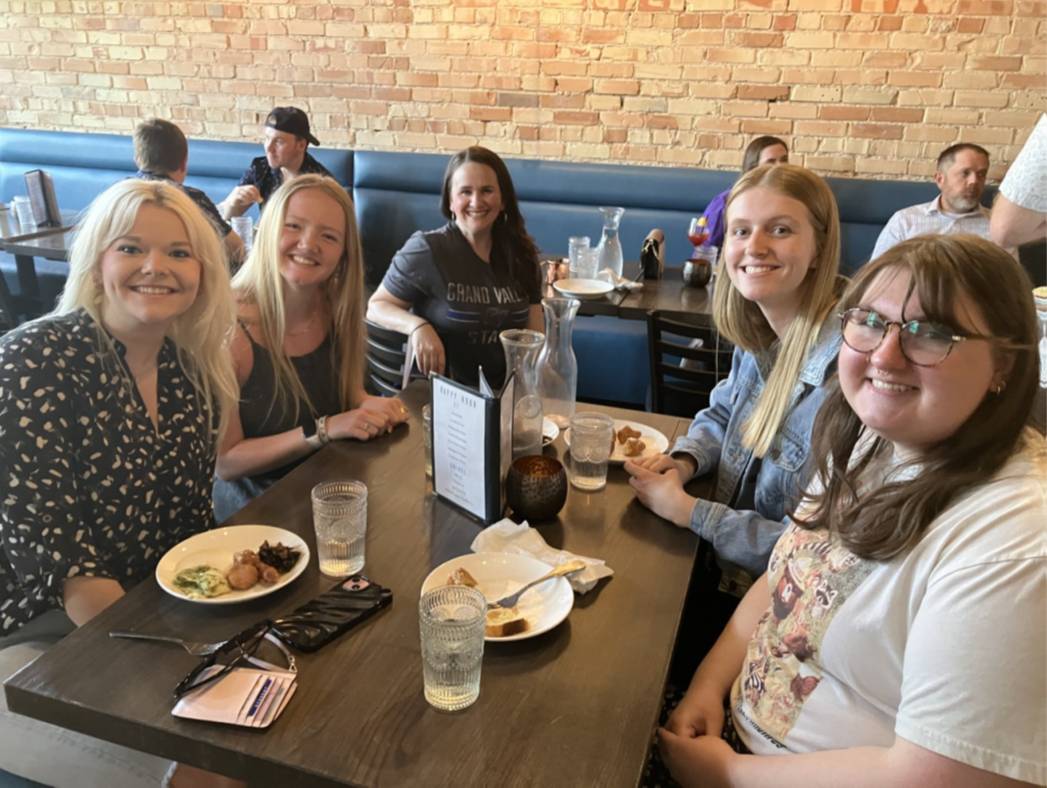
Grand Valley State University Social Studies Pro-gram alumni and current Social Studies students gathered on Thursday, April 24, 2025, at Fratelli’s Kitchen & Bar on the west side of Grand Rapids to share ideas and stories. The Alumni and Out-reach Committee hosted the reception in conjunction with the Michigan Conference for the Social Studies Conference, held April 25-26 at the Eberhard Center.
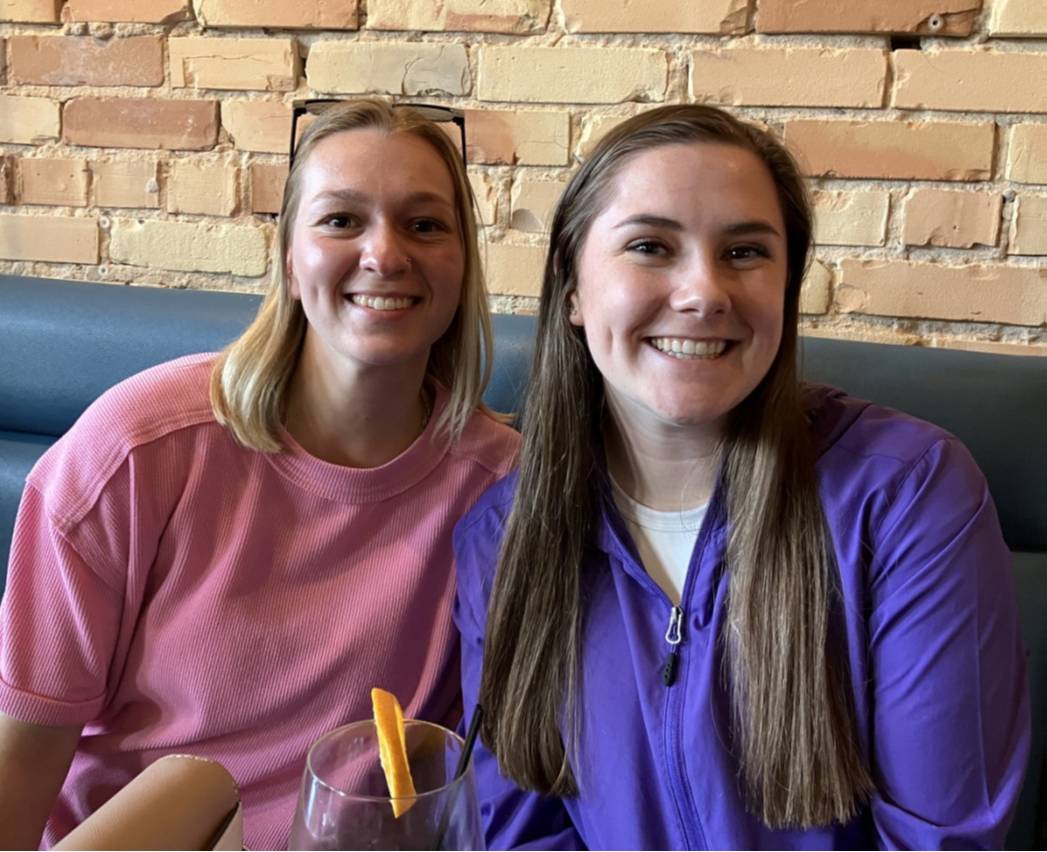
Undergraduate News
Professor Daley and Students Explore the History of Black Baseball in Grand Rapids
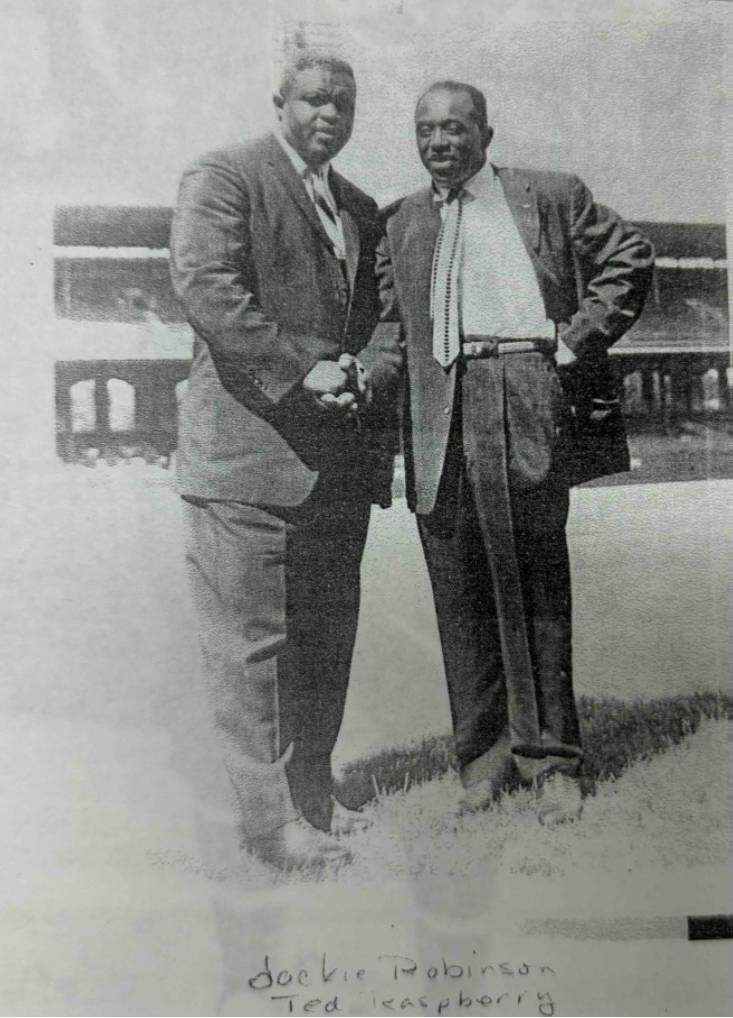
Jackie Robinson with local base-ball impresario Ted Rasberry, 1960. For more on the history of African American baseball players in Grand Rapids, see “Professor Matthew Daley and Student Researchers Explore the History of Black Baseball in Grand Rapids,”
Black baseball thrived in Grand Rapids in the mid-twentieth century, including at the venerable Sullivan Field, now Valley Field, on the northwest side of Grand Rapids. Professor Matthew Daley, an expert in Michigan and Great Lakes history and public history, has been working with students to discover more about this overlooked part of Grand Rapids sports history.
In the summer of 2024, Professor Daley worked with Connor Madden (Class of 2024) to research the history of black baseball in Grand Rapids. Black teams like the Grand Rapids Black Sox, owned by Ted Rasberry, and the Chicky Bar Giants played against black, white, and integrated teams at Sullivan Field. Black teams played elsewhere in Grand Rapids as well. Legendary pitcher Satchel Paige played in front of thousands of fans at Bigelow Field in Wyoming Township.
Rasberry’s Black Sox built the steel-and-concrete Is-land Baseball Field just off the east bank of the Grand River in downtown Grand Rapids, where the new Acrisure Amphitheater is currently under construction. Regional and local teams, black and white, played at the stadium through 1934.
Lacking consistent coverage of black clubs in the Grand Rapids papers, Professor Daley and Madden had to pore over out-of-town and neighborhood newspapers looking for information.
Next fall, Madden will be starting the Master’s Program in History at Bowling Green State University with a full tuition scholarship.
Investigating black baseball and local ballparks is only one of Professor Daley’s ongoing public history projects. He is working with the Muskegon Intermediate School District and Muskegon Public Schools to secure a state grant to create a collaborative digital repository of local oral history narratives. Eventually, he and his collaborators want to visit some of the towns and rural areas in the South from where the black migration to Muskegon originated.
Professor Daley will also be working with junior his-tory major and GVSU Student Summer Scholar (S3) Ava Politi on a study of urban renewal and gentrification in Grand Rapids, focusing on neighborhoods around Monroe Center and Wealthy Street. Ava is also an intern on a digital history project for the Grand Rapids Historical Commission, which is located in the History Department and supervised by Professor Daley.
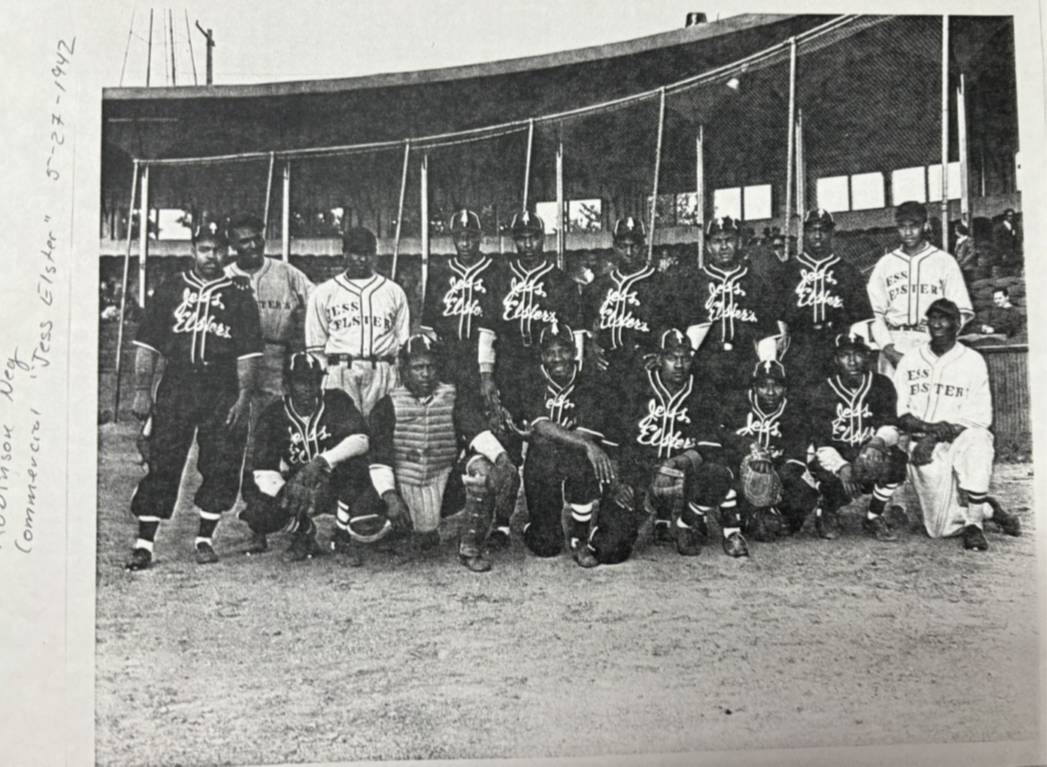
Jess Elster's Colored Athletics, Valley Field, May 1942; Elster managed and organized black baseball in Grand Rapids.
Senior Meghan Leach’s Year of Museum Internships
[1747316055].jpg)
Pictured on the right: Meghan examining glass negatives at the Ellingen Residence.
Meghan Leach’s interest in museum studies has taken her around the world, or, at least from Zeeland, Michigan, to Ansbach, Germany, and back to Grand Rapids—all cities in which she completed museum internships in 2024. A senior history major and art history minor, Meghan plans on pursuing museum studies after her graduation this spring. The intern-ships have been exciting. Meghan has delighted in “seeing the differences between the museums” at which she worked.
Last winter, Meghan interned at the Zeeland Historical Society, a valued partner of the GVSU History Department. Working at a small historical society enabled her to gain direct experience in many different aspects of museum work. She found herself drawn to the world of collections development.
Meghan contributed to the Cultivating West Michigan exhibition at the Zeeland Historical Society. “Her contributions enriched the project, and her passion for public history was evident in everything she did,” said Audrey Rojo, curator at the Society. Several GVSU students have interned at the Historical Society, and their work, Rojo observed, “has been instrumental in preserving and interpreting Zeeland’s history.”
Through the Sister City Cultural Exchange program of her hometown, Frankenmuth, Michigan, Meghan next traveled to Ansbach, Germany, where she worked at the Markgrafen Museum, a local history museum built into the original fortifications of the city. Working at the museum, which features Ansbach pottery, banners, knight's armor and weapons, required Meghan to use her German language skills. Tasked with making a report on ten things she liked about the museum and ten things she would treat differently, she toured the head curator, who appreciated her “fresh set of eyes.”
She spent her last two weeks in Ellingen, Germany, at the Ellingen Residence, a Schloss, or palace. Among other things, she reviewed a collection of glass negatives.
When she returned, Meghan interned at the Gerald Ford Presidential Museum, helping with the Ford at 50: Decisions That Defined a Presidency exhibition and learning, among other skills, how to inventory collections and safely package valuable artifacts for shipping to other museums.
Meghan enjoyed working in a variety of museums, from large to small, and her year of interning only confirmed her love of public history and museum work.
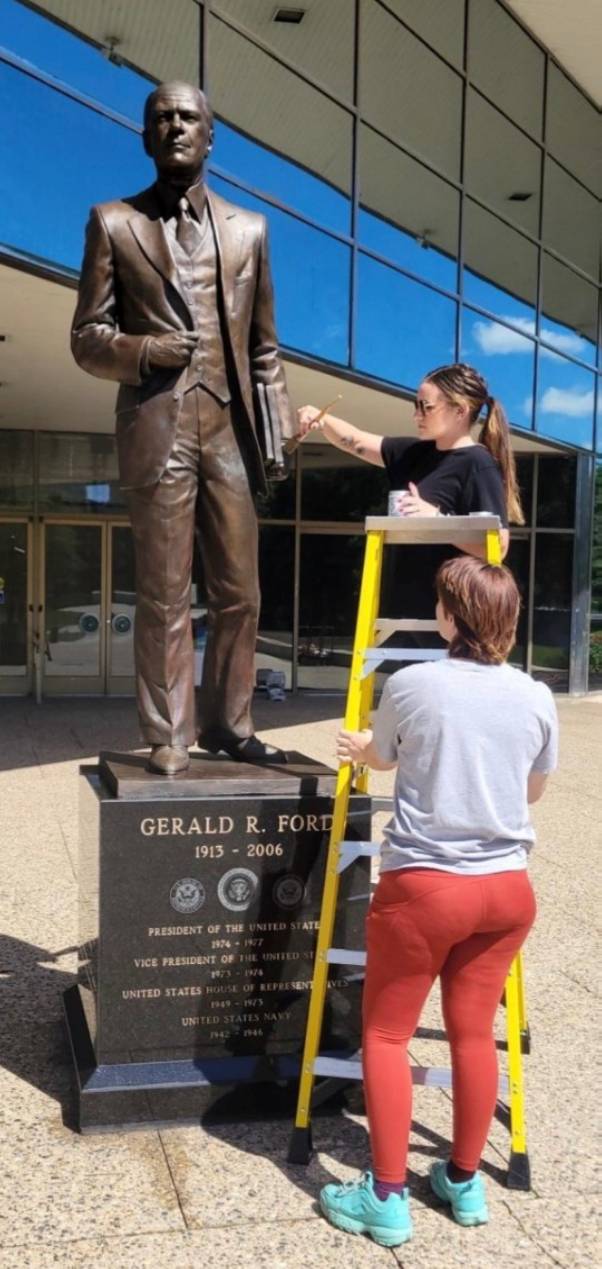
Meghan and fellow intern Valen Vennard cleaning the Gerald R. Ford statue at the Ford Presidential Museum.
Senior Thesis: Ben Joseph (Class of 2024) Explores Family History
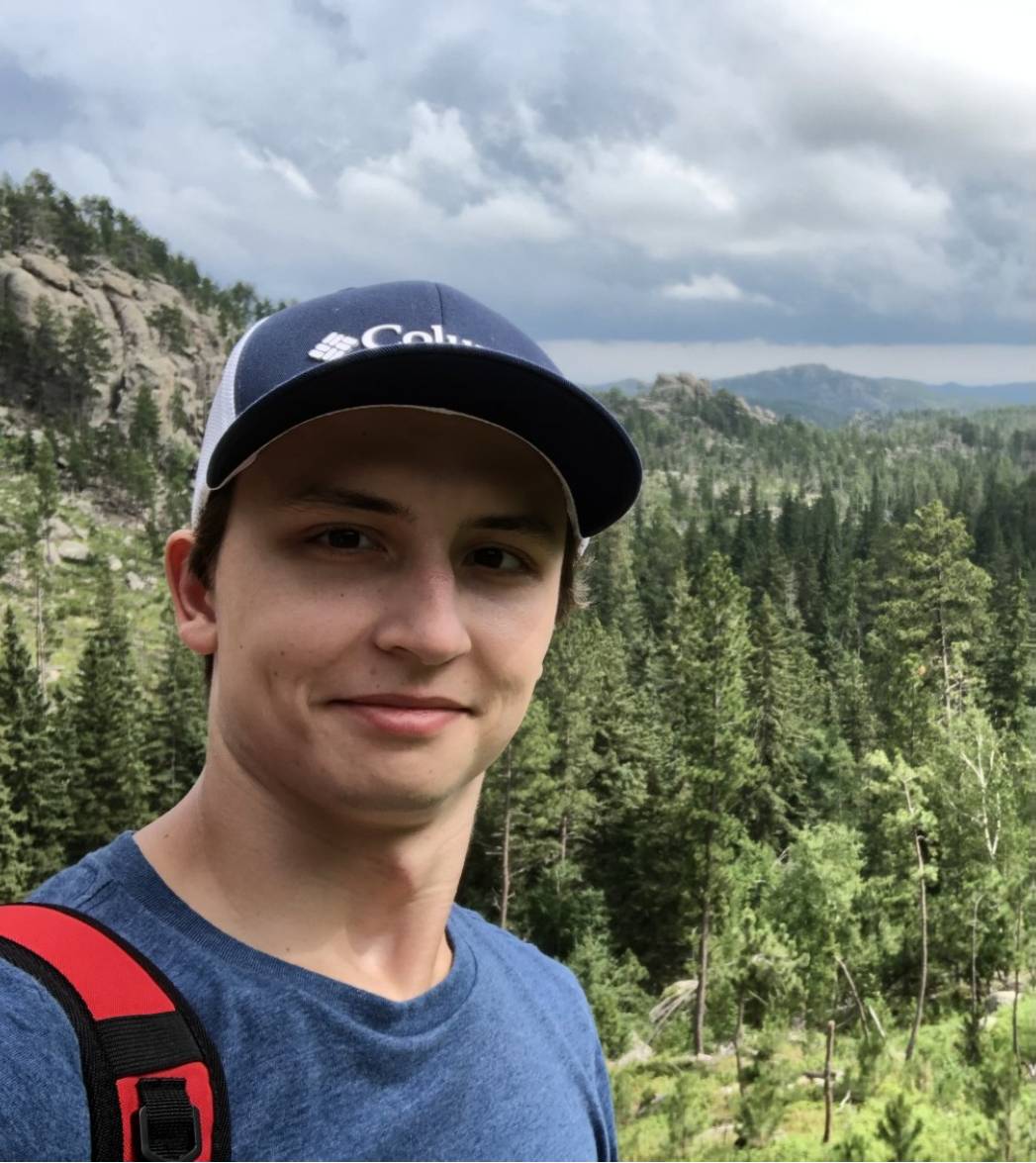
In Fall 2023, Ben Joseph (Class of 2024) completed a senior thesis entitled “Against the Tide: Conscientious Objectors in the Second World War,” which drew on his own family’s history. He is currently in the master’s program at the University of Michigan School of Library and Information Science.
As I have learned from multiple research projects, it is often quite difficult (though certainly not impossible) as an undergraduate or an independent scholar to access the necessary primary sources to make meaningful contributions to the discipline. Knowledge of these constraints shaped how I approached the topic I picked for my senior thesis. I am fortunate that my grandparents keep close track of family history, providing unique windows into the past. I ultimately decided to write about my great-grandparents, Robert and Virginia Rohwer.
Robert Rohwer’s life overlapped with some of the twentieth century’s most interesting events in rather unique ways. He completed a Ph.D. in Sociology at the University of Wisconsin in the 1940s during a time when it was a hotbed of radical intellectual activity and producing influential thinkers such as C. Wright Mills (Robert knew him personally, since he was in the same program). Robert’s career in academia was short-lived, however. He was teaching at the University of Oklahoma in 1951 when the state government started requiring all government employees to take an anticommunist loyalty oath, which applied to university faculty. Robert resigned out of protest, for he was a target of suspicion due to his status as a conscientious objector during WWII. Robert spent part of the war at a Civilian Public Service camp in Wellston, Michigan, about twenty miles east of Manistee.
Robert and Virginia shared this commitment to peace activism, for the impact of Robert’s conscientious objector status was lifelong. Not only in academia but in everyday life, Robert and his family carried a stigma
due to his past as a conscientious objector. Yet this did not seem to dissuade them from acting in accordance with their consciences.
They were involved in antiwar circles throughout their lives, from the 1940s to the early 2000s. Overall, this story provides an interesting case study of a little-known group of people who made unique contributions to American society, not in spite of but because of their opposition to war-fare. I was initially hesitant to write about my great-grandfather, for how objective can one be when writing about a not-too-distant ancestor?
Yet it also seemed like it would be a shame not to do so, for Robert’s story provides an incredibly unique perspective on an historical era of widespread popular interest.
The topic of conscientious objection usually conjures images of Vietnam-era war resistance in the popular imagination, inviting numerous questions about this earlier, little-known group of objectors. After all, why would someone resist WWII, the “good war”? However, as I learned from my research, such a characterization based on hindsight not only does a disservice to the past, but it is misleading to those
who wish to understand it.
The consciences of pacifists were shaped by a variety of influences, and their past remained a crucial aspect of their identities for much of their lives. There was a significant pacifist movement in the 1930s, influenced by the ugly aftermath of the First World War. According to Robert’s unfinished memoir, his views were influenced by the Baptist student pastor at the University of Wisconsin, Reverend George L. (“Shorty”) Collins. Collins was a WWI veteran who became a pacifist upon his return and dedicated his life to anti-war activism.
History Capstone Students Present Research in Showcase
Students in Professor Paul Murphy’s Fall HST 495: History Cap-stone course presented their research to faculty and students on Dec. 4, 2024. Here are a few samples of their work.
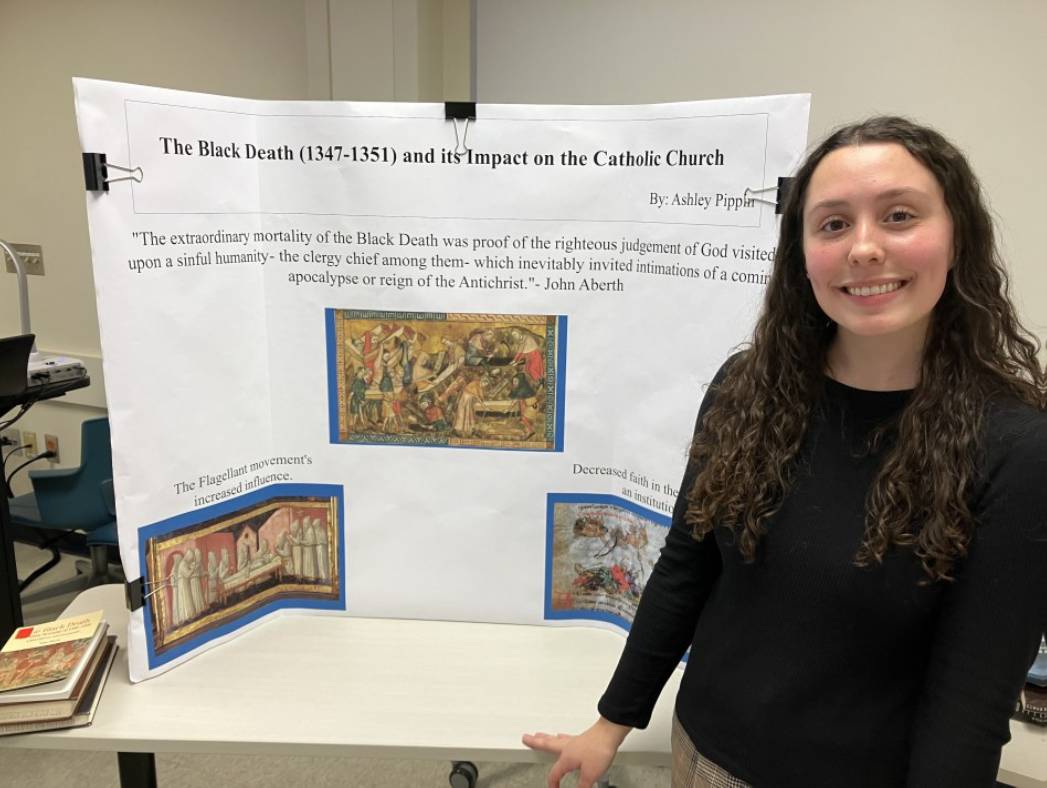
Ashley Pippin, “The Black Death (1347-1351) and Its Impact on the Catholic Church”
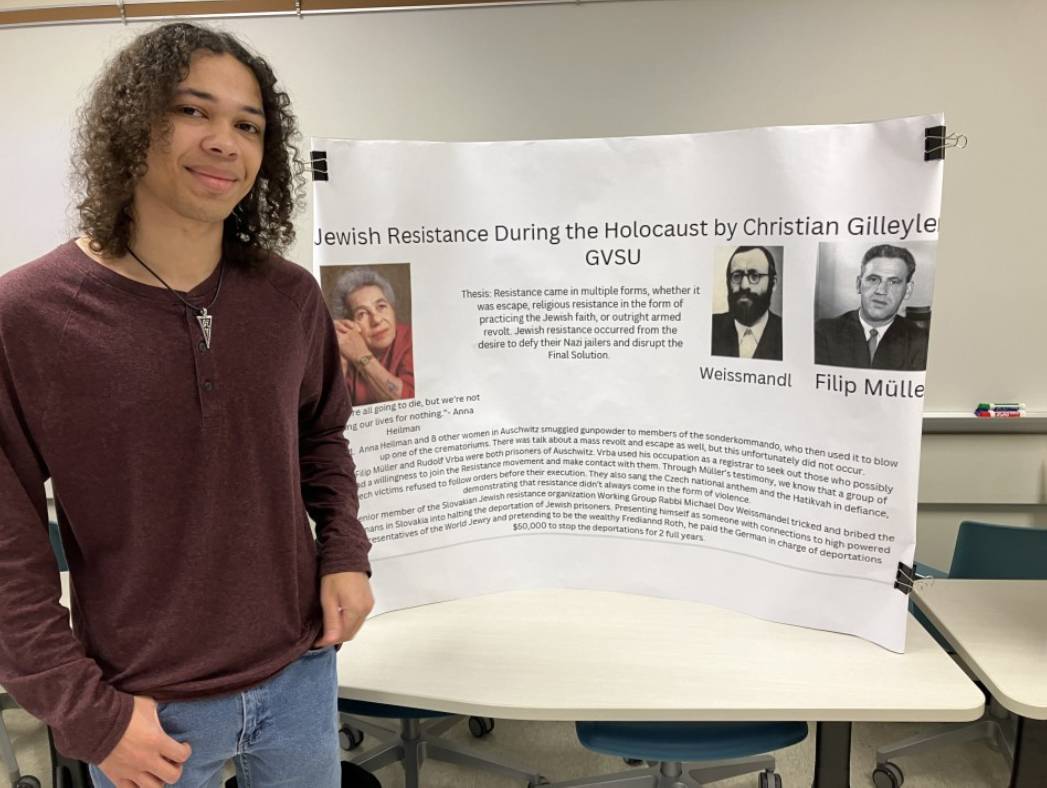
Christian Gilleylen, “Jewish Resistance during the Holocaust”
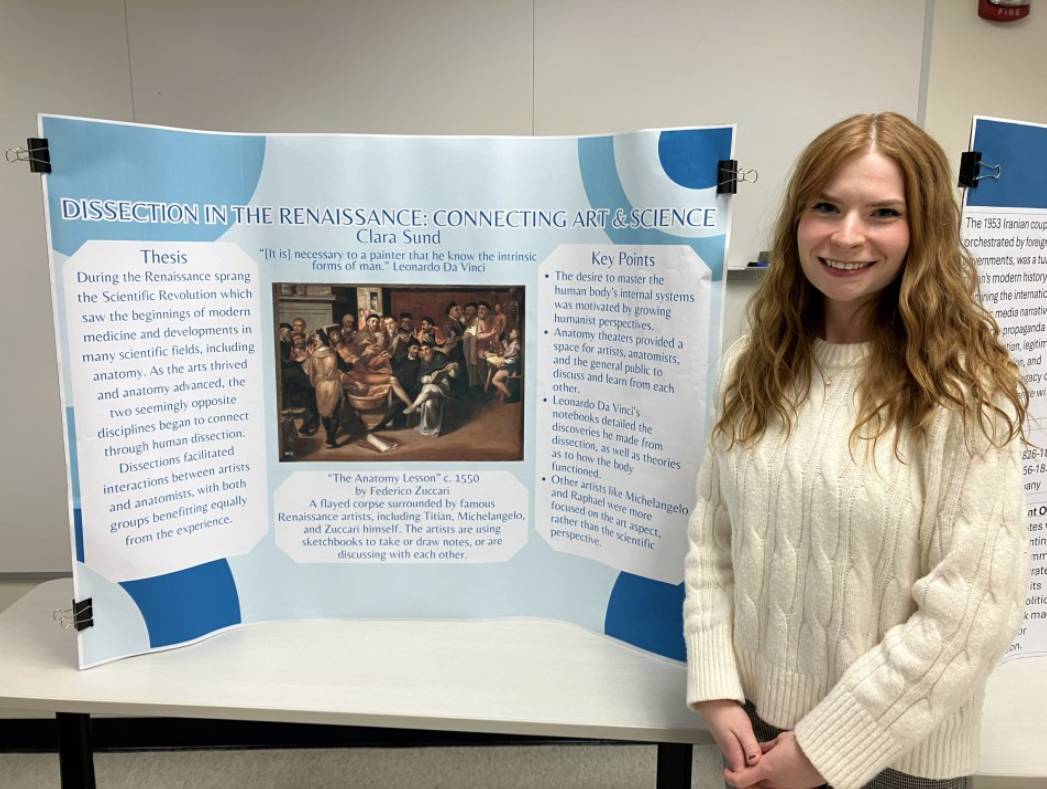
Clara Sund “Dissecting in the Renaissance Connecting Art & Science”
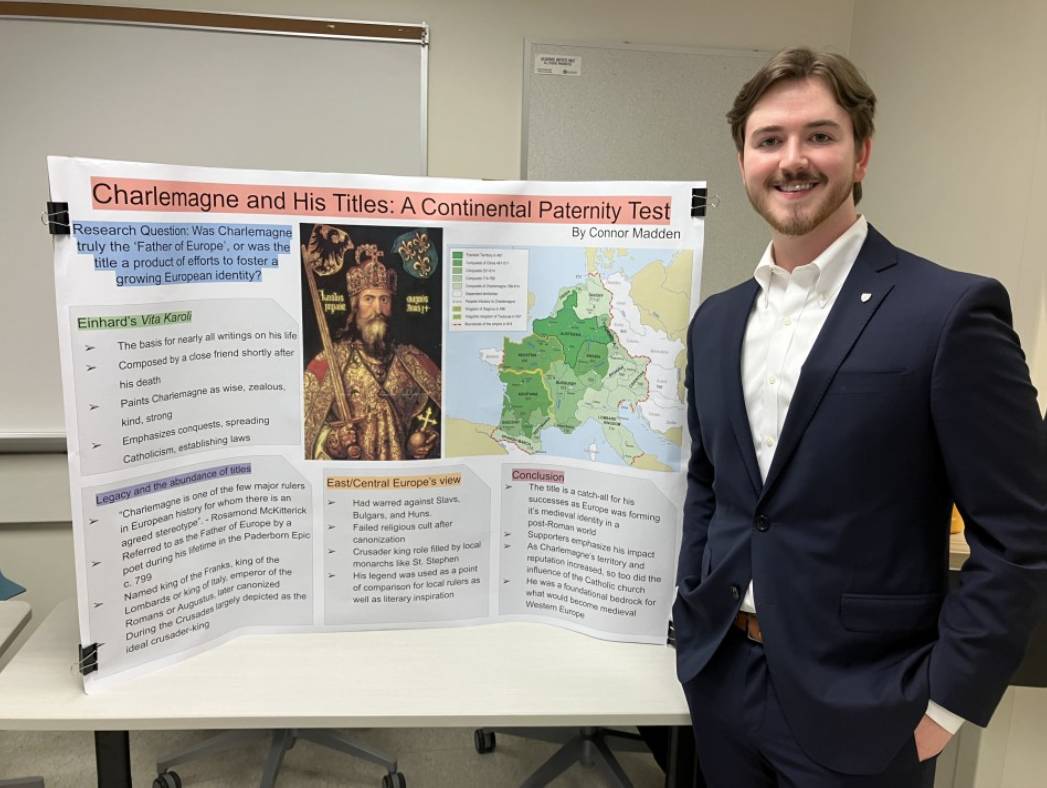
Connor Madden, “Charlemagne and His Titles A Continental Paternity Test”
Phi Alpha Theta Inductees
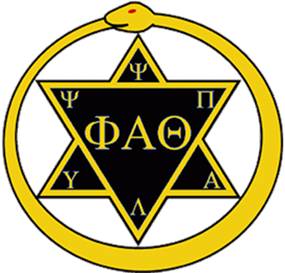
New Members of Phi Alpha Theta
- Taylor Braman
- Anheles Coronado
- Elizabeth Dohm
- Lucas Daniel Gerhard
- James Albert Gervais
- Lauren Palencik
- Ashley Pippin
- Ava Politi
- Owen D. Ross
- Brendan Webste
History and Social Studies Undergraduate Awards
Scholarship Recipients
- Excellence in a Discipline, History—Jason Hall
- Excellence in a Discipline, Social Studies—Anna J. Theune
- Award of High Merit, History—Ashlynn Scafidi
- Quirinus Breen Prize —Ashlynn Scafidi
- Glenn A. and Betty J. Niemeyer History Scholarship—Kate Roelof
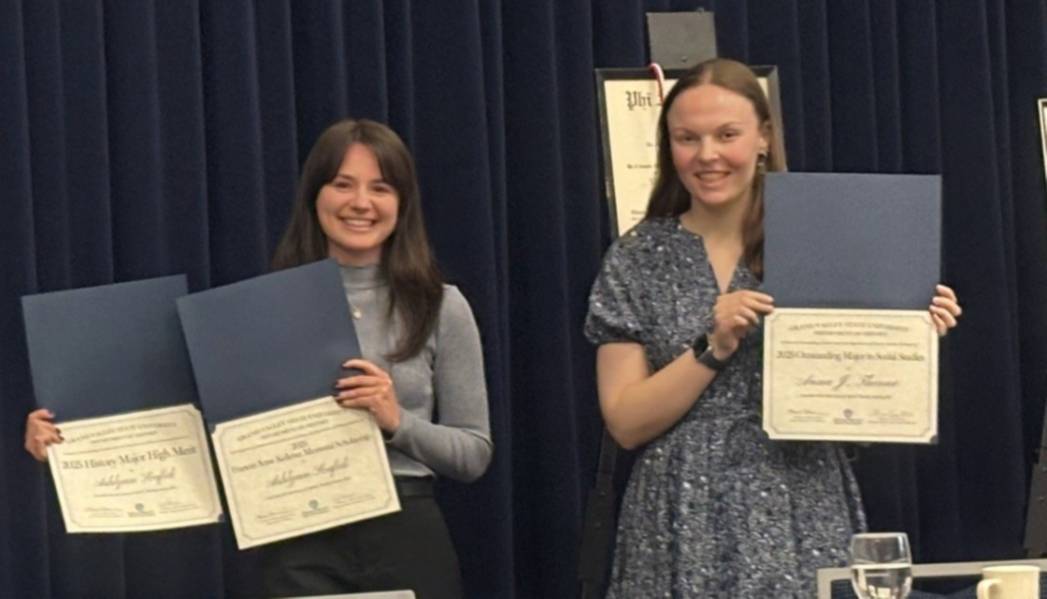
Faculty News
Professor Steve Tripp Retires
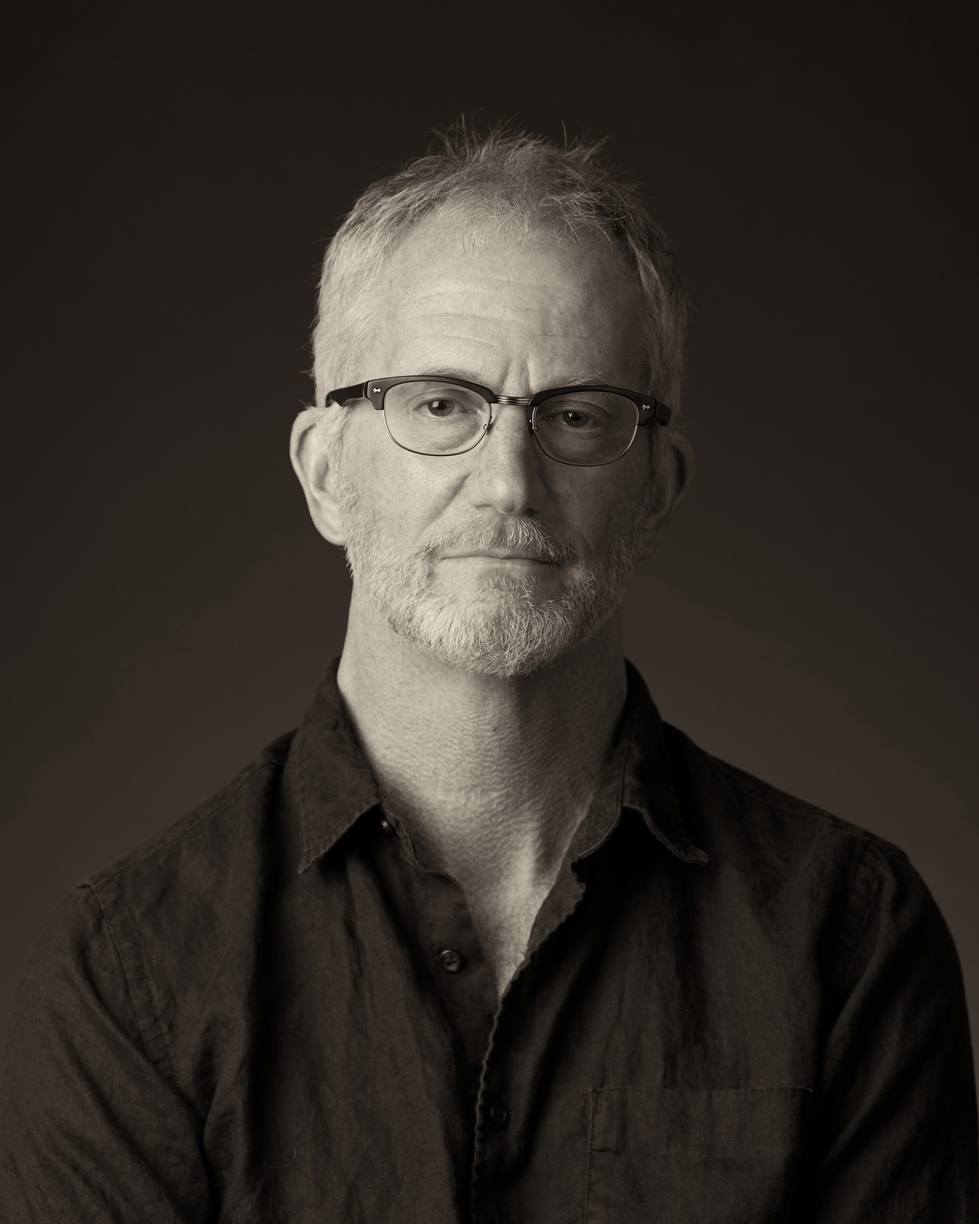
Professor Steve Tripp retires at the end of the Winter 2025 semester. He came to Grand Valley State in 1990. Over the years, he has been an inspiring and creative teacher, both in the History Department and the Honors College. Professor Tripp helped spearhead the creation of the Faculty Teaching and Learning Center, played a large role in creating the History Department’s 100-level curriculum, and has long taught the introductory writing course on topics drawn from across American popular culture. He introduced upper-division courses in African American history, labor history, sports history, and the Civil War and Reconstruction. He has also been a model teacher-scholar and an inspiration to his colleagues, with scholarship ranging widely over American social history, sports history, and masculinity. He is currently writing about the ways in which Americans explored and defined the American Way during the Depression years, looking especially at the films of Frank Capra and Robert Riskin. Professor Tripp has published Yankee Town, Southern City: Race and Class Relations in Civil War Lynchburg (1996) and Ty Cobb, Baseball, and American Manhood (2016). The Department thanks Steve and wishes him the best.
Professor Louis Moore Moves to Michigan State
Professor Louis Moore has accepted a position at Michigan State University beginning in Fall 2025. Professor Moore came to Grand Valley State in 2008 and has taught courses in African American and civil rights history, including creating new courses, such as “The Black Athlete in History.” He also directed the Africana Studies Program and has been a noted mentor and leader on campus. Professor Moore is the author of I Fight for a Living: Boxing and the Battle for Black Manhood, 1880-1915 (2017), We Will Win the Day: The Civil Rights Movement, the Black Athlete, and the Quest for Equality (2017), and The Great Black Hope: Doug Williams, Vince Evans, and the Making of the Black Quarterback (2024). We wish Professor Moore great success as a Spartan.
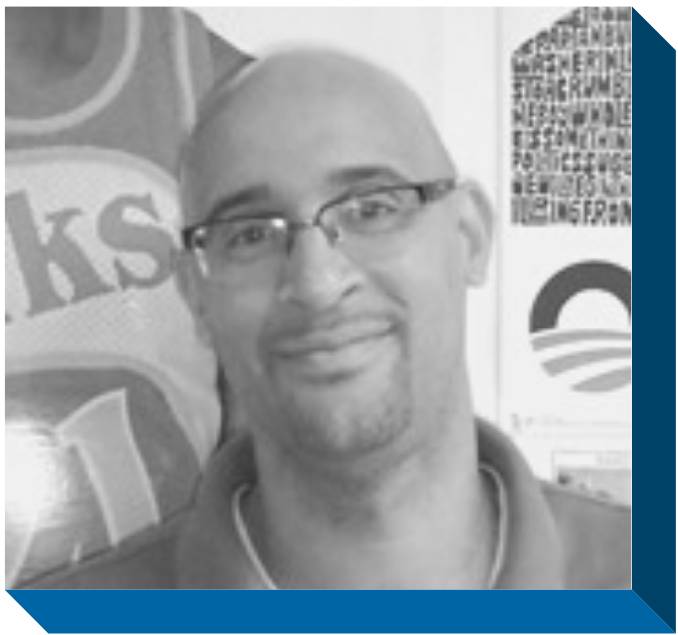
Visiting Professor Kevin Chrisman Takes Position at Hampden-Sidney
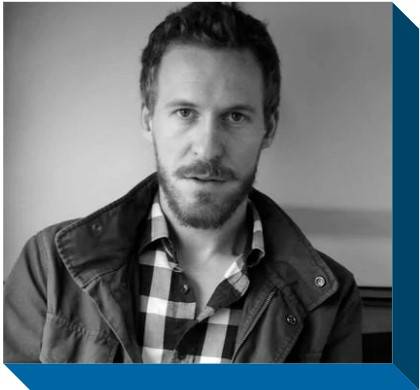
Visiting Professor Kevin Chrisman, who has been teaching American history at Grand Valley State this year, has accepted a tenure-track position at Hampden-Sidney College in Virginia. Professor Chrisman specializes in the cultural history of modern Mexico, particularly consumerism, gender, sexuality, and transnational business history. His book manuscript, “Meet me at Sanborns: A Cultural History of the Mexican Department Store (1903-2023)” is under contract to the University of Nebraska Press. We thank Professor Chrisman and wish him good fortune in his new position.
Additional Faculty Updates
[1624623328].jpg)
Steeve Buckridge gave a lecture on Jamaican lace-bark at the University of Bonn, Germany.
Grace Coolidge published “Noble Maternity in Castile, 1400-1650,” in Early Modern Maternities in the Iberi-an Atlantic, edited by Emily Colbert Cairns and Nieves Romero-Diaz (Amsterdam University Press, 2024). She presented her research on early modern noble families at conferences in Denmark and Canada.


Jason Crouthamel participated in a virtual roundtable discussion of “German-Jewish Pilots in the First World War” at Baruch College, City University of New York.
Mathew Daley supervised a Summer Undergraduate Research project with Connor Madden (Class of 2024) on black baseball in Grand Rapids and has received a Michigan Department of Education grant, with collaborators, to facilitate teaching diverse histories in Muskegon. He has also received two different grants to employ student interns to revise the Grand Rapids Historical Commission’s History of Grand Rapids and Furniture City websites.
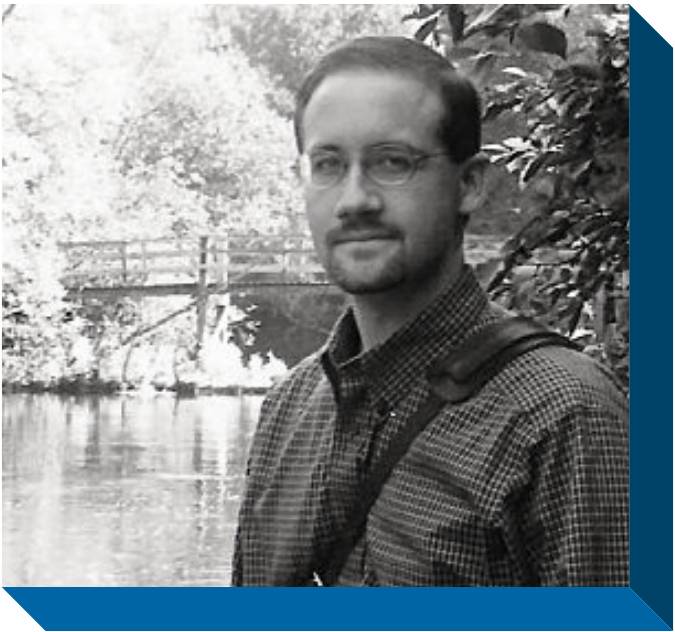
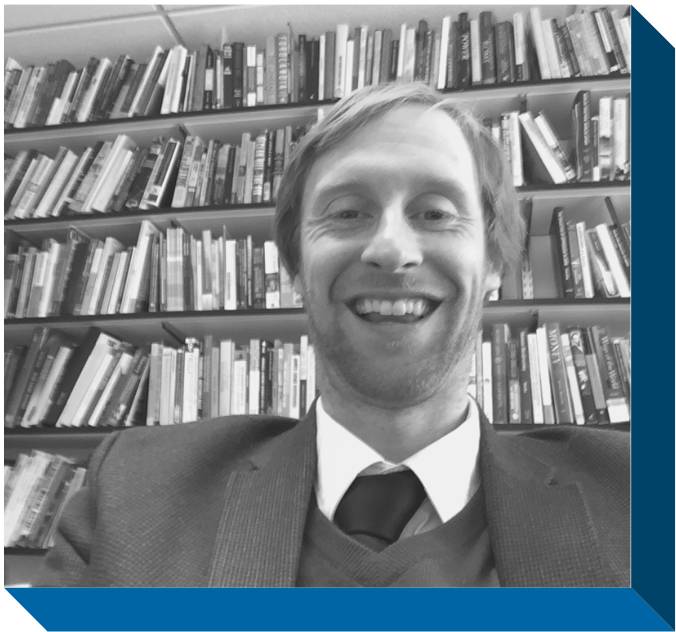
David Eaton has published a new edition of World History through Case Studies: Historical Skills in Practice (Bloomsbury, 2025). With a collaborator, he won a National Endowment for the Humanities grant to work on teaching Africa in world history courses.
Abigail Gautreau presented on teaching and publishing public history at the National Council on Public History Annual Meeting, which she reprised for a virtual meeting of the NCPH and Organization of American Historians.
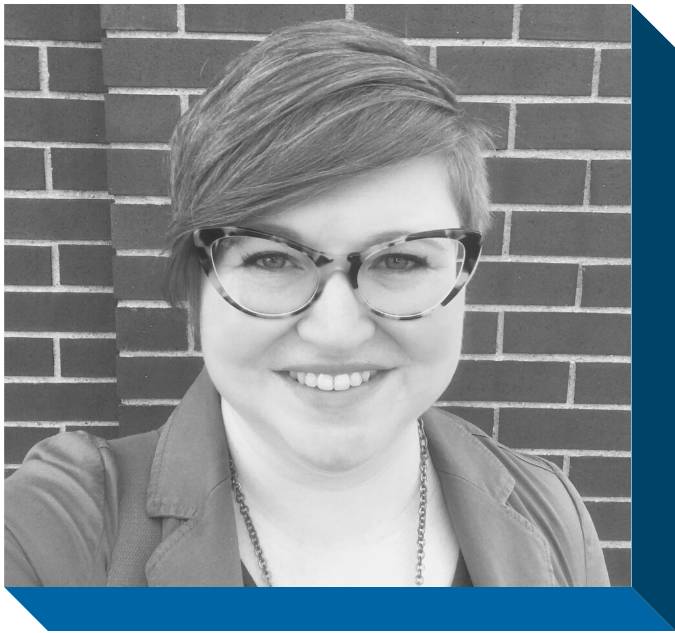

Mike Huner published “Movilidad, pasaportes y control social en el Estado lopista,” in Un estado para armar: Aproximaciones a la construcción estatal en el Paraguay decimonónico, ed. Ignacio Telesca (SB Editorial, 2024).
Yue Liang published “Technology Diplomacy in Early Communist China: The Visit to the Jingjiang Flood Diversion Project in 1952,” British Journal for the History of Science (June 2024): 191-203, and “The Relief Campaign for the 1954 Yangzi River Flood and Rural Collectivization in Early Communist China,” Twentieth-Century China, 49, no.2 (May 2024): 150-167. She presented her scholarship at conferences in Seattle and Princeton, New Jersey.

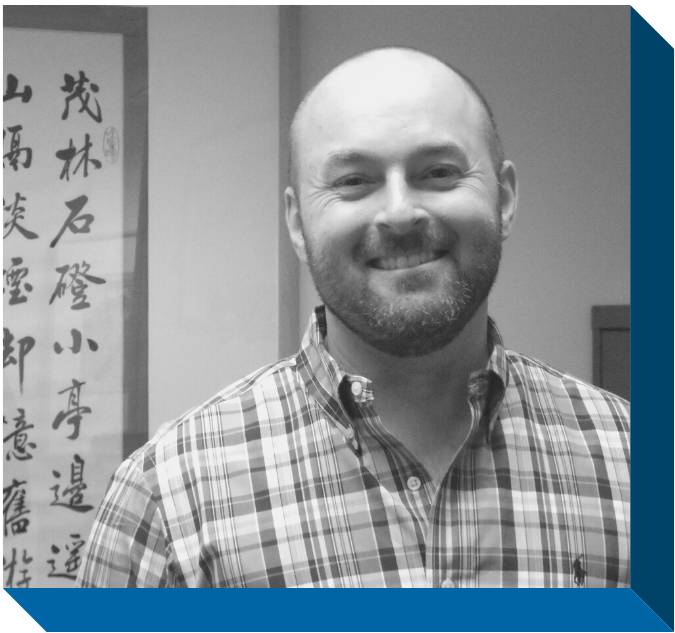
Chad Lingwood presented on medieval Sufism at the Fourteenth Biennial Iranian Studies Conference in Mexico City, and served as Faculty Program Coordinator for Middle East Studies in the winter.
Doug Montagna has published “Evangelism, Organization, and the Union: A Brief History of Christianity in the Midwest through the Civil War" in The Oxford Handbook of Midwestern History (forthcoming, 2025) and “The Dynamism of the Old Northwest: How the Region Shook up the Presbyterians and Congregationalists and Invigorated the Abolitionist Movement,” in the Middle West Review.
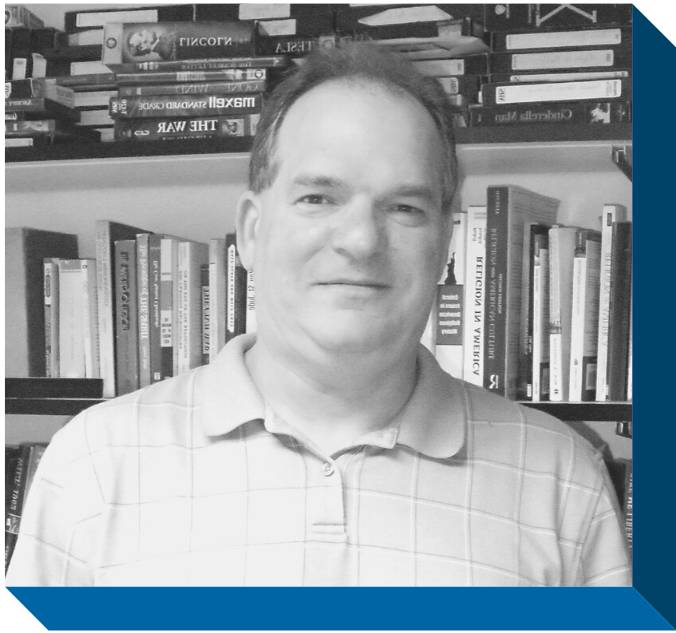

William Morison published “Kritias of Athens and Oligarchic Propaganda,” in T. Figueira and R. Munson, eds. Misinformation, Disinformation, and Propaganda in Greek Historiography (Bloomsbury, 2025)
Paul Murphy published “More (and Sometimes More Important) Ideas that Made America Roundtable: Re-thinking the Primacy of Pragmatism” in The Carryall.
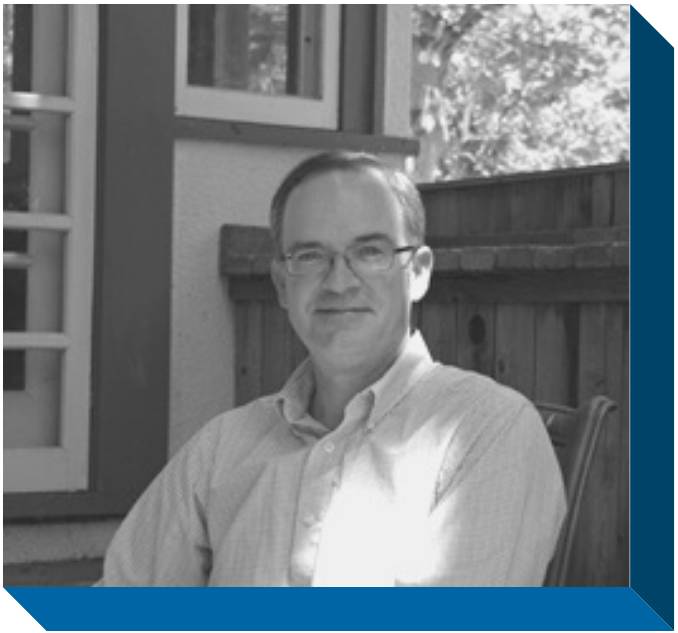
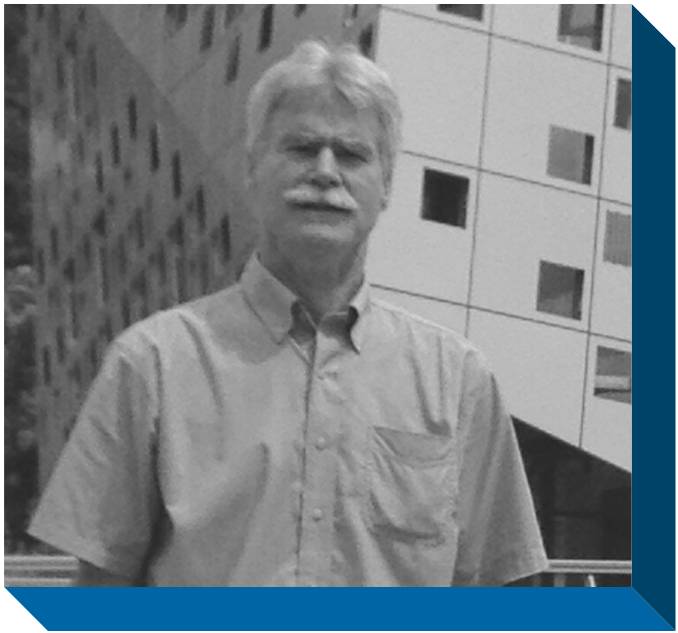
Sean O’Neill serves on the Board of Editors of the Michigan Historical Review and continues to lead National History Day in Michigan, coordinating the regional History Day competition.
Nora Salas is director of the Kutsche Office of Local History, Grand Valley State University. She presented on “Public History and State Historical Markers: A University and Latinx Community Collaboration in Michigan” at the Organization of American Historians annual conference and, with Hannah McBride, on the experience of women in homes for unwed mothers in Grand Rapids for the Grand Rapids Public Library History Detectives program.
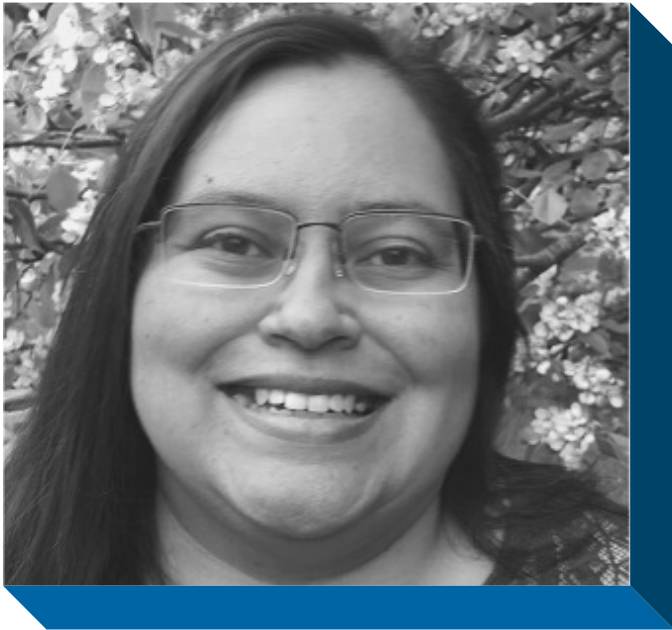
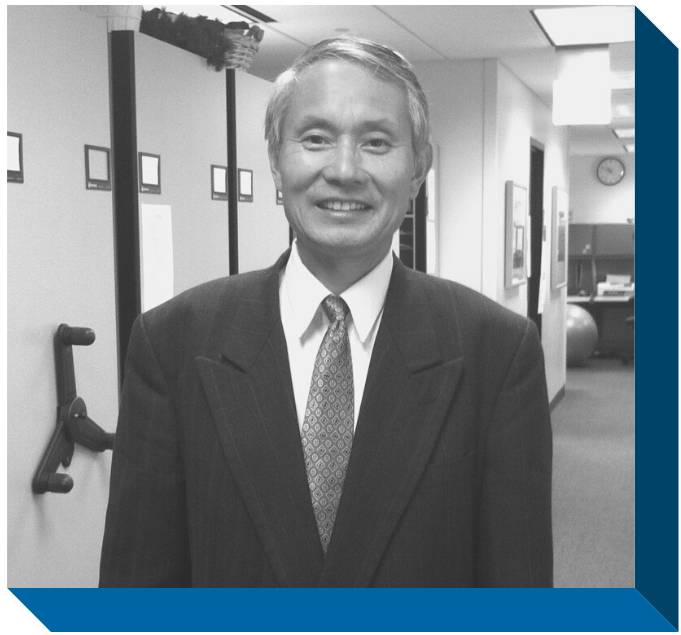
Patrick Shan published Li Dazhao: China’s First Communist (State University of New York Press, 2024) and presented a paper on China President Xi Jinping’s use of the past at the American Historical Association annual conference in 2024, which appeared as “What did the CCP Learn from the Past? An Analysis of Xi Jinping’s Dexterous Utilization of History,” in China under Xi Jinping: A New Assessment (Leiden University Press, 2024).
Tammy Shreiner published Teaching Data Literacy in Social Studies: Principles and Practices to Support Historical Thinking and Civic Engagement (Teachers College Press, 2024). With Bradford Sykes, she won a grant to expand teachers’ knowledge of data visualization and published multiple articles on data visualization and data literacy. She serves as Director of the College of Liberal Arts and Sciences PK-12 Initiatives and the Pedagogical Content Knowledge for Elementary Teaching Program.
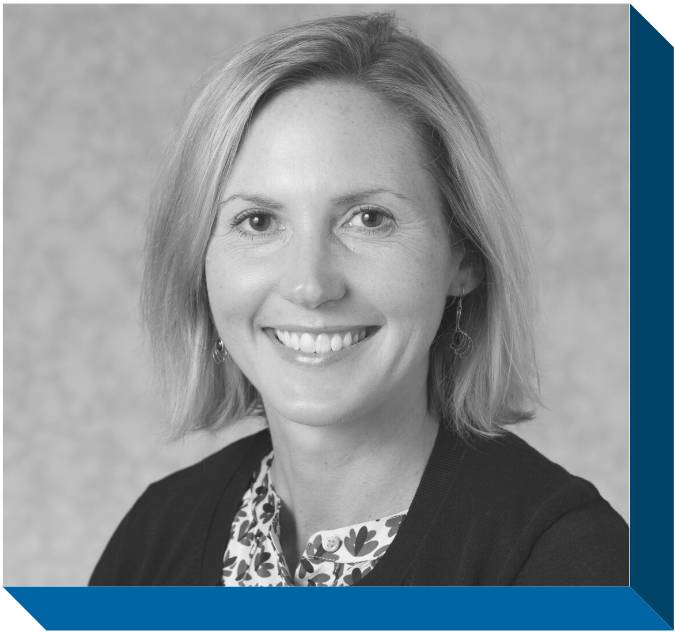
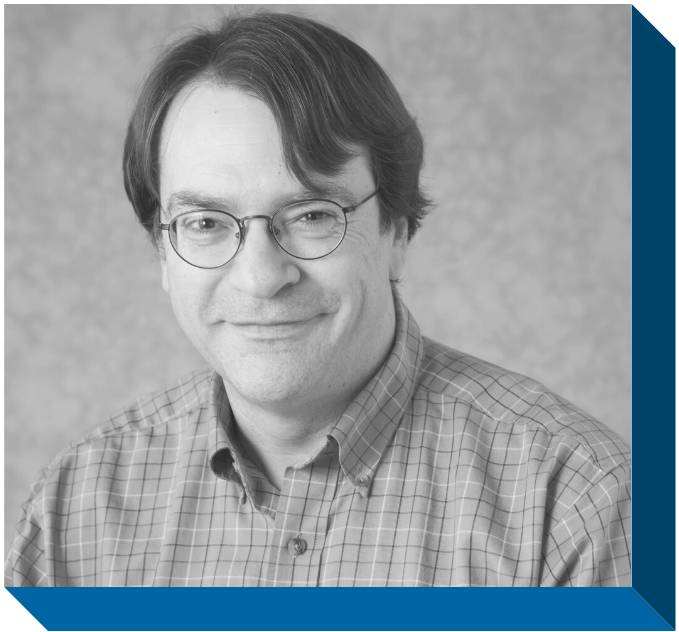
Jim Smither serves as director of the Grand Valley State University Veterans History Project and presented on the project and women’s professional baseball players in the 1940s and 1950s around the state.
Scott Stabler published “Reconstruction’s Accomplishment: Black Education and the Rise of the Civil Rights Movement” with Justin Sheldon and Timothy J. McKeeby in Teaching Emancipation and Reconstruction, 1861–1876, edited by Matthew R. Campbell (Peter Lang, 2025). He co-directed a study abroad program in Vietnam in Summer 2024.


Blair Stein published “Making Across Modalities: Rethinking the Digital/Analog Binary in a First-Year Seminar,” with Alex Cohen, Camille Frazier, and Lisa Propst, Modern Language Studies, 54:1 (2024): 42-63 and participated in a roundtable on “Science, Extraction, and Extreme Environments: Pasts, Presents, and Futures” in Colorado.
Annie Whitlock published Place-Based Social Studies Education: Learning from Flint, Michigan (Teachers College Press, 2024) and, with co-authors, “Diving In to Elementary Social Studies Instruction: What Teachers Report Is Happening,” in Theory and Research in Social Education (2024) among other articles. She is serving as president of the Michigan Council for Social Studies. She presented “Making Sense of Michigan’s State Social Studies Standards” with David Zwart at the Michigan Conference on Introductory History Courses.
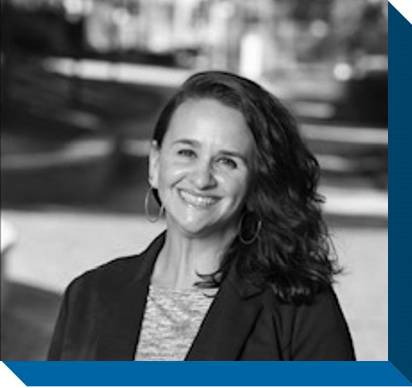
[1642004304].jpg)
David Zwart published “Pedagogical Humility: Learning from Social Studies Majors’ Intellectual Autobiographies,” in the Great Lakes Social Studies Journal, 4:2 (2024). He presented “Making Sense of Michigan’s State Social Studies Standards” with Annie Whitlock at the Michigan Conference on Introductory History Courses.
Events
Great Lakes History Conference held September 2024
In September 2024, the History Department hosted the annual Great Lakes History Conference. Professors Jason Crouthamel and Julia Köhne (Humbolt University in Berlin) co-organized this year’s conference on the theme of “Intoxicated Warfare: Psychoactive Substances, Violence and Trauma.”
The interdisciplinary conference brought together specialists from Europe, Africa, and the US to discuss how drugs and alcohol have been used to enable killing as well as cope with the traumatic effects of war. Colleagues from the humanities, social sciences, and health sciences participated on a variety of panels. They explored not only medicalized and military systems for managing drug use, often as a catalyst for violence, but also how individuals use intoxicants for self-therapy. Three keynotes shared their expertise and scholarship on drugs and war: Professor Edward Westermann (Texas A&M University), Dessa Bergen-Cico (Syracuse University), and Peter Andreas (Brown University). Next year’s conference on “Climate, Environment, Psyche, and History” will be held October 17-18, 2025.
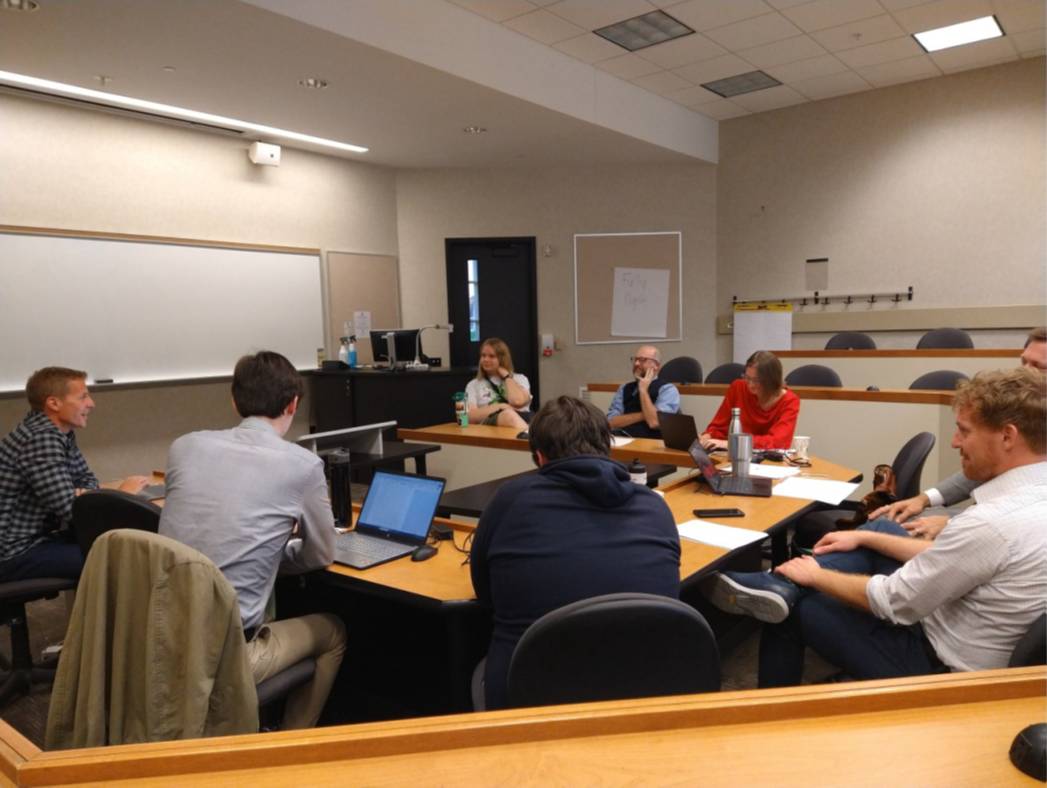
Regional History Day Competition Held at GVSU on March 15
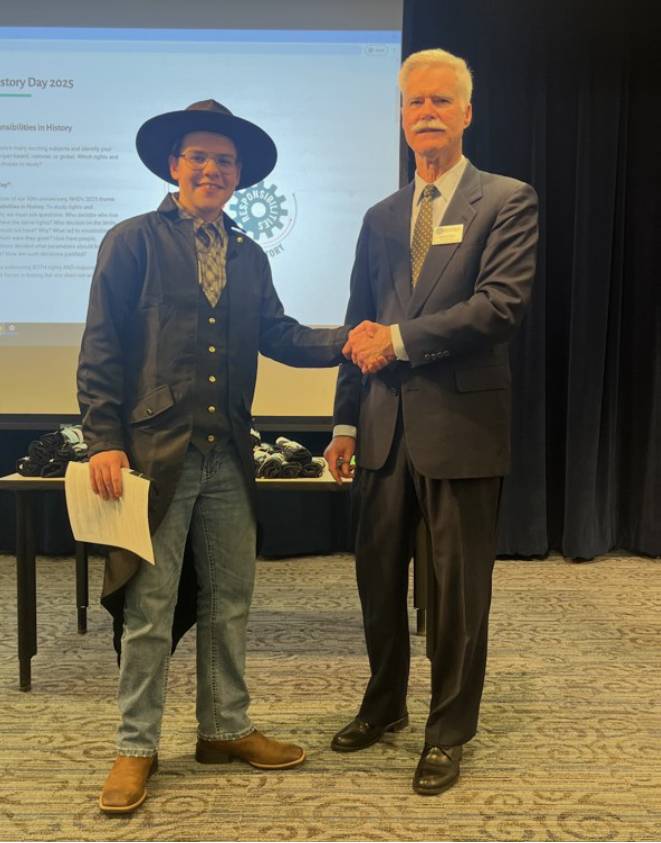
Forty students across five schools participate in this year’s regional History Day competition at the Kirkhof Center on March 15, 2025. The theme was “Rights and Responsibilities.” The competition welcomed students from Godwin Heights Middle School for the first time. The judges provided great feedback and all students and families had a great time. Professor Sean O’Neill coordinates the competition.
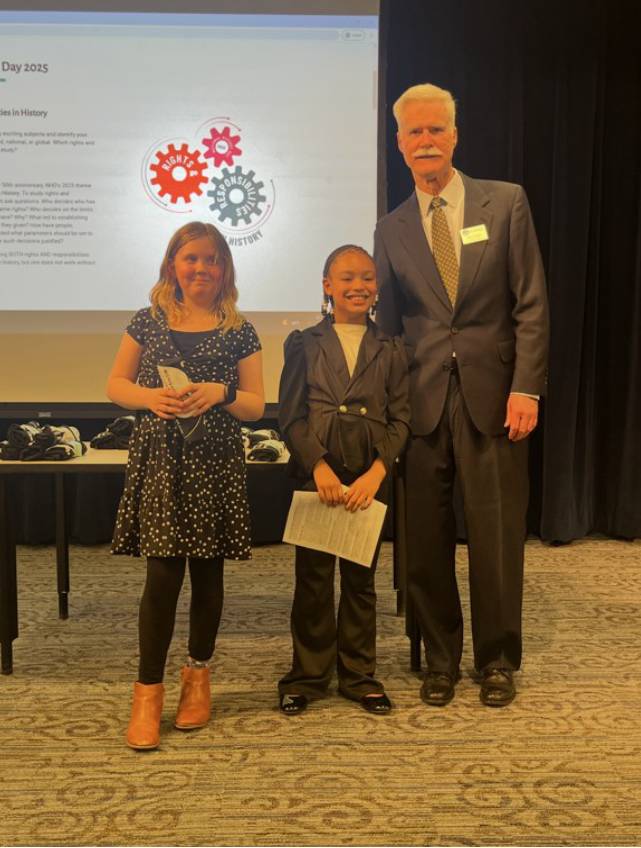
Upcoming Events
- April 25-26, 2025 — Michigan Council for the Social Studies Annual Conference: “Building Bridges: Con-necting Cultures, Ideas, and Bridges in Social Studies” at Eberhard Center, Grand Valley State University. Details can be found here. Keynote speakers include Susan Ford Bales, daughter of President Ford and Jordan Klepper, one of the hosts of The Daily Show and a west Michigan native.
- October 17-18, 2025 — Great Lakes History Conference: “Climate, Environment, Psyche, and History.”
- Saturday, November 8, 2025 — Grand Valley State University Homecoming.
- March 21, 2026 — Michigan History Day Regional Contest, Russel H. Kirkhof Center, Grand Valley State University.
Please send us Alumni News!
E-mail and tell us about what is new in your life — what you are doing, where you are working, professional and personal milestones, awards and honors received, or just memories of GVSU. We are eager to share the news.
Send a photo along as well!
Contact Paul Murphy at murphyp@gvsu.
Supporting History and Social Studies Students at Grand Valley State University
If you are interested in supporting current Grand Valley State University undergraduates, consider making a donation to one of the following funds established to honor past history faculty or advance current historical work. Contact the History Department with any questions (616-331-3298) or the University Development Office (https://www.gvsu.edu/giving/).
Quirinus Breen Prize Scholarship: Benefits students regularly enrolled in any history course.
Frances Ann Kelleher Endowed Memorial Scholarship: History or Social Studies students studying abroad.
James F. and Virginia L. Goode Global Programs Endowed Scholarship: Need-based scholarship for students planning to study abroad.
Glenn A. and Betty J. Niemeyer History Scholarship Endowment: Benefits deserving junior or senior history majors.
David M. Stark Endowed Scholarship in Latin American History: Benefit s History and Latin American Studies majors.
Veterans History Project Endowment: Funds oral history interviews, documentaries, educational materials, and live presentations by U.S. veterans.
Kathleen Underwood Endowed S3 Fellowship: Assists students in the Student Summer Scholars (S3) Program and who are conducting research on social inequality in women and gender studies and/or history.
Joan L. Chapman Endowed Scholarship: Assists students from the College of Liberal Arts and Sciences who are enrolled in either the history or English programs and also demonstrate financial need in covering the cost of their education.
Follow Us On Social Media
Catch up with Previous Editions
About Us
Grand Valley State University Department of History
The craft of history interprets the past. History examines the lives of people, the consequences of ideas, and the products of human ingenuity. Historians engage in deep inquiry and persuasive debate. They craft narratives about the past based in evidence. The skills students gain through the study of history allow them to analyze and interpret evidence and evaluate how human societies change over time.
History Highlights
Grand Valley State History Department Alumni Newsletter
Vol. 5, No. 1 (April 2025)
The History Department Alumni Newsletter is published by the Alumni Outreach Committee:
Steeve Buckridge
Michael Huner
Chris Jansson (Digital Newsletter Editor)
Paul Murphy (Chair, Newsletter Editor)
Scott Stabler
Questions, comments, or if you have news for future editions:
please contact Paul Murphy ([email protected]).
GVSU Department of History, Mackinac Hall, D-1-160, 1 Campus Dr., Allendale, MI 49401, (616) 331-3298
Chair: Michael Huner ([email protected])
Department Coordinator: Elizabeth Ehlers ([email protected])
Joint Department Coordinator: Chris Jansson ([email protected])

[1747323029].jpg)


